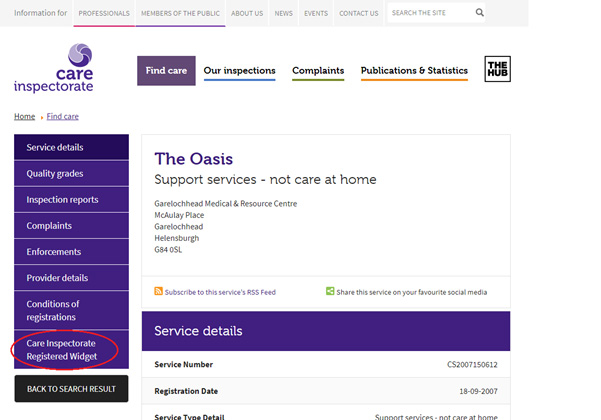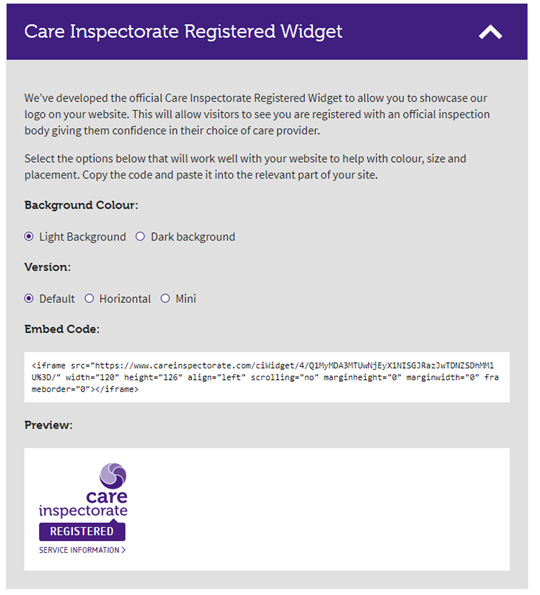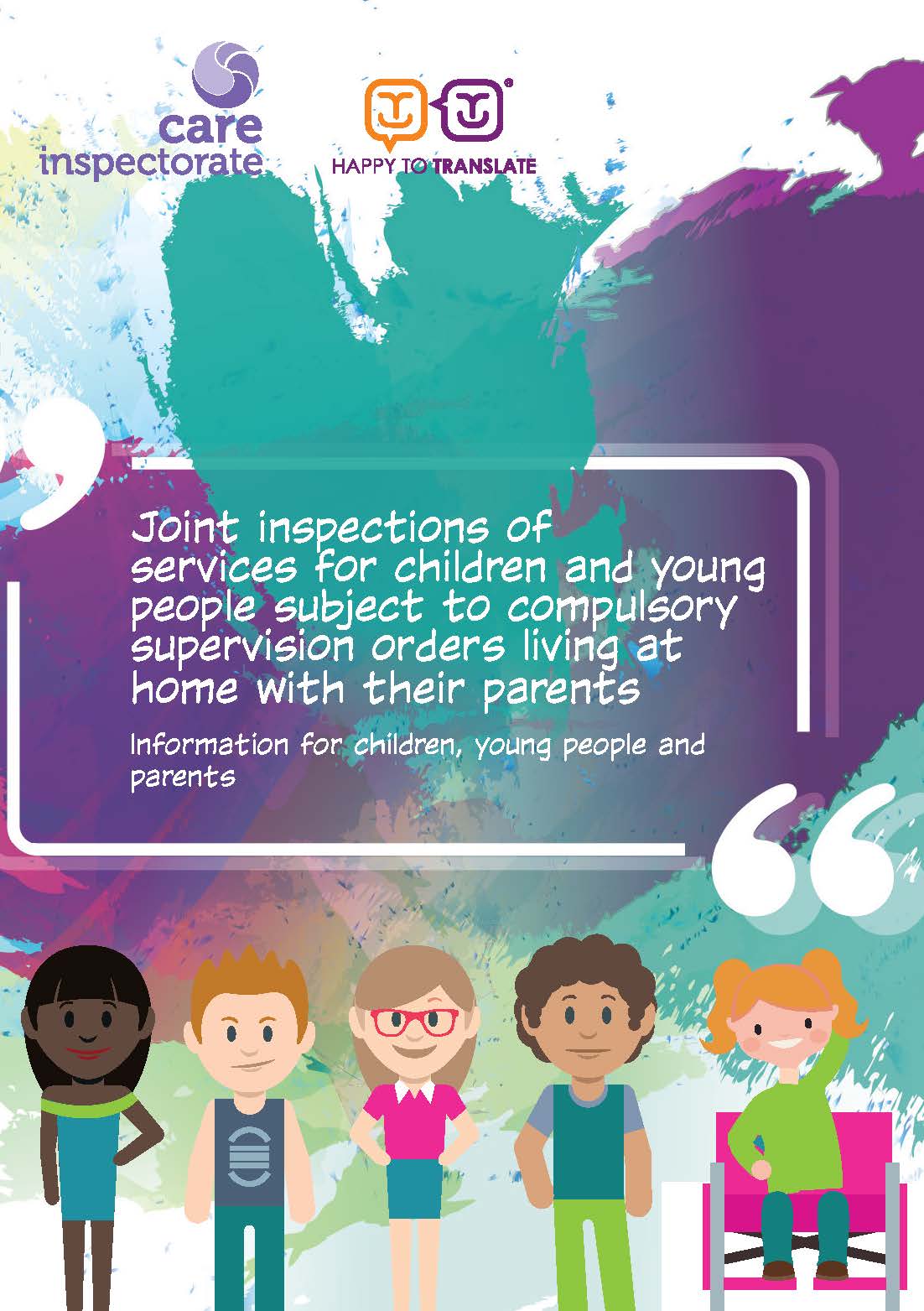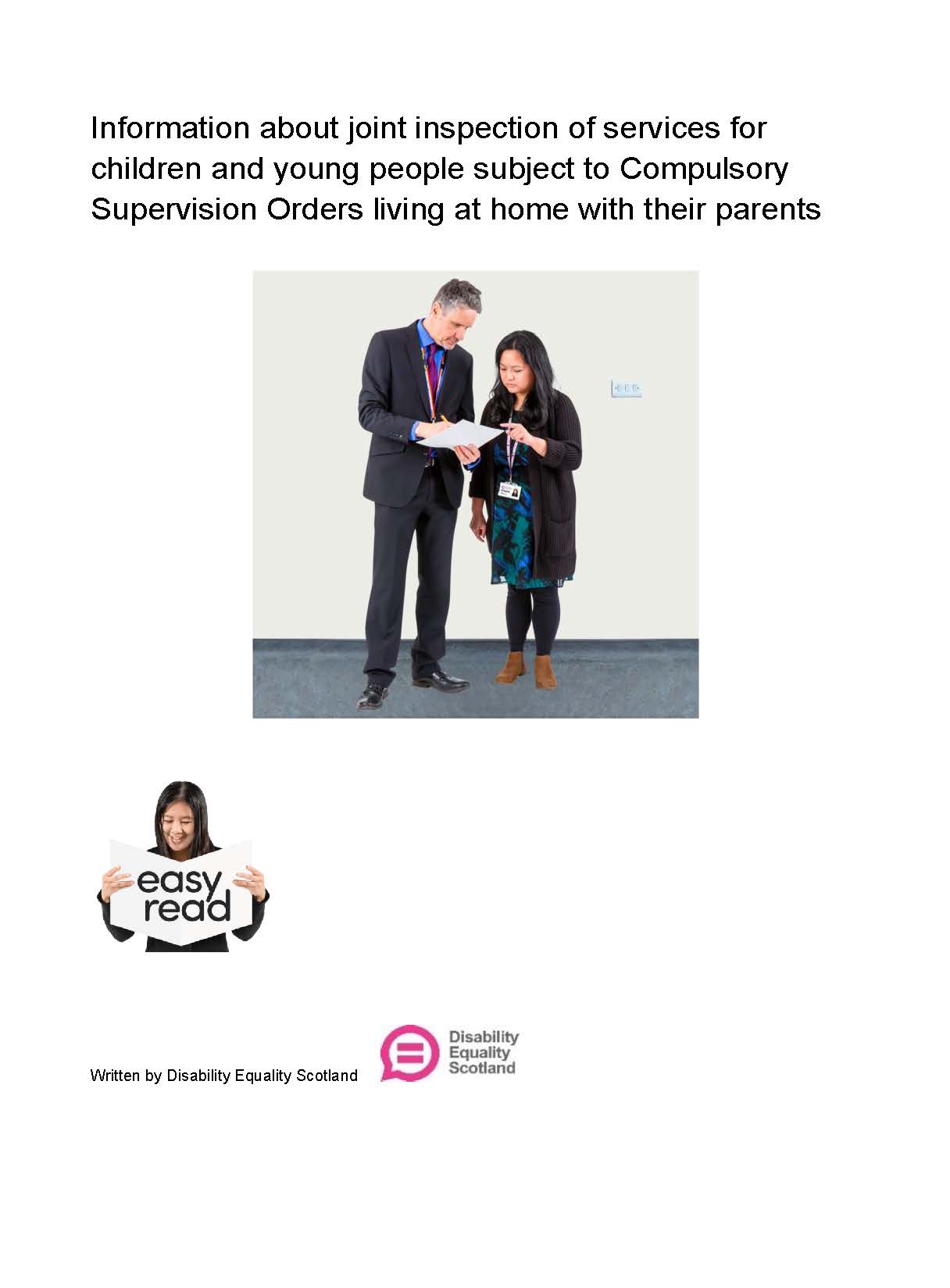How to use our 'Registered by' widget
What is the 'Registered by' widget?

The widget is a logo with some coding behind it that can be displayed on any website. Each registered care service has its own widget to connect directly to its own information pages on the Care Inspectorate website.
So, if you are a care service and you want to show your website visitors that you are registered with us, you can download the widget and display it on your website. When your website visitors click on the widget, a new window will open that displays the Care Inspectorate information page for your service. Your own webpage will still be open.
Who can use the widget?
Anyone can use the widget, but they must abide by our terms and conditions, which are at the bottom of this page.
How do I download the widget?
Go to the information page for your service, on this website.

Click on the ‘Care Inspectorate Registered Widget’ tab in the menu bar on the left.
Follow the instructions. You may need to ask your website administrator, hosting provider or website developer to help you.

Add the embed code to your website where you want it to appear. For example, in a footer, a sidebar and so on.
The widget code will work on your website straight away.
Troubleshooting
This is a simple and straightforward piece of coding and should not cause issues. If you do have difficulty, first contact your web administrator. If your web administrator is unable to resolve the issue, please email us at This email address is being protected from spambots. You need JavaScript enabled to view it..
Terms and conditions
You can use the widget:
- in relation to any care service registered by the Care Inspectorate.
You cannot:
- use it in any way that would deliberately mislead people
- modify it in any way
- use it any way that would bring the Care Inspectorate into disrepute
- sell it or sublicence it
- use it in any way that could intentionally damage or overburden the Care Inspectorate website
- put anything around the widget that implies that the Care Inspectorate endorses you or your service.
Other conditions of use
The widget is designed to be used in conjunction with the Care Inspectorate website. Accordingly, use of the widget is also governed by our website's core privacy notice.
Disclaimer of warranties
We make our best efforts to make sure the widget is always available and provides accurate information, but it is provided 'as is', with no warranties.
Limitation of liability
The Care Inspectorate disclaims any responsibility for any harm resulting from your use of the widget.
You understand and agree that you access and/or use the widget at your own discretion and risk, and that you will be solely responsible for any damages to your computer system or loss of data that results from accessing or using the widget.
How we do it
Justice social work: inspection of community payback orders
In our overview report published December 2021, we presented the key findings aggregated across all five inspections.
Between September 2018 and November 2020, we completed five inspections of justice social work services with a particular focus on community payback orders in these areas:
- Scottish Borders
- West Dunbartonshire
- Inverclyde
- Dumfries and Galloway
- Aberdeen City.
We produced an inspection guide for this activity. In summary the inspection methodology involved:
- submission of a self-evaluation by each local authority area
- review of a representative sample of relevant records of people who were or had been subject to a community payback order
- interviews with people currently subject to a community payback order
- focus groups and interviews with members of staff, partner agencies and stakeholders, and senior managers, chief officers, elected members with responsibility for community justice social work
- verbal feedback to the local authority on findings based on the analysis and evaluation of all aspects of the inspection
- publication of an inspection report for each participating local authority area that included evidence-based evaluations of key quality indicators using a six-point scale.
Community justice partnerships: supported and validated self-evaluation
Between 2018 and 2020, we worked in partnership with His Majesty’s Inspectorate of Constabulary in Scotland (HMICS) to support the implementation of the new community justice model through a validated self-evaluation approach. We carried out assurance activities across the following five community justice partnerships, one of which incorporated three local authority areas:
- North Lanarkshire (did not involve HMICS)
- Clackmannanshire
- Ayrshire (North, South and East)
- Shetland
- East Lothian
For more information on the supported and validated self-evaluation methodology please refer to our guidance and additional information. In summary our activity included:
- support and guidance from a strategic inspector for partnership areas to undertake self-evaluation
- submission of a self-evaluation by the partnership
- analysis of the submitted documents by the Care Inspectorate/HMICS team
- follow-up activities with the partnership to explore any areas of uncertainty (these included visits, interviews and focus groups)
- verbal feedback on the findings to each partnership based on the analysis of all the evidence gathered
- publication of the validation letter.
Community justice social work: throughcare review
The Scottish Government established the national criminal justice Recover, Renew, Transform (RRT) programme in response to the ongoing impact of Covid-19 on the justice system in Scotland. One of the tasks of the Recovery of Community Justice and Prevention of Offending sub-group was to explore breach of licence and recall to prison. This was to further understand recall and related processes to reduce the number of people being recalled to custody, where appropriate.
In March 2021, the Care Inspectorate received a request from the sub-group to undertake a focused piece of work relating to breach of licence/recall to custody. The strategic justice team undertook a review of throughcare with a primary focus on community justice social work practice.
The review sought to:
- identify potential barriers to reintegration; and
- seek assurance that community justice social work contributions to breach and recall processes were operating as they should.
As part of the review, we also gathered the views of individuals from across Scotland who had been recalled to prison following a breach of their throughcare licence conditions.
We published a report of our findings in September 2021. The report contains more detail on the methods we used.
Our collaborative work with scrutiny and improvement partners
We have a long-standing commitment to contribute to inspections of prisons and other institutions led by His Majesty’s Inspectorate of Prisons in Scotland (HMIPS). Over the past three years, our contribution has been led by the strategic justice team with support from other strategic colleagues as appropriate. Throughout 2020/2021, we contributed to HMIPS Covid-19 liaison activities through on-site visits and remote contact with community agencies.
Throughout 2021/2022, we will continue to work with scrutiny and justice partners to contribute to the thematic prison review of risk management, progression and early release.
A separate piece of collaborative work will focus on the extent to which community justice partners are delivering on national priorities relating to early intervention and prevention.
In July 2023, we commenced a joint thematic review of prison-based social work, in partnership with His Majesty’s Inspectorate of Prisons in Scotland (HMIPS). This thematic review will consider the strengths and challenges in the governance, leadership, and accountability of prison-based social work services in Scotland. The full Terms of Reference for the review can be found here. This work will conclude in April 2024.
How we do it
Our inspections last for a number of months. We collect information about the area before we visit it. This helps us to understand what happens there and what is affecting the way that services are being provided.
During the inspection, a team of inspectors from the Care Inspectorate, Education Scotland, HM Inspectorate of Constabulary Scotland and Health Improvement Scotland will:
- speak with the staff
- speak with children and young people and listen to their views
- speak with parents
- read information about the children and young people.
This gives us the chance to find out if children, young people and their families are getting the help that they need and if services are making a difference to their lives. What individual people tell us during inspection is confidential. Our reports do not include any information about them or their family, or anything that could identify them. However, we do have a duty to pass on information if there are concerns about someone’s safety.
We have surveys for children, young people and families and we use and safeguard the data gathered from these in the same way as we do with what you tell us in person. Our approach to participation during inspection reflects the importance we give to hearing from children and young people. We also have a staff survey which also enables us to maximise the feedback we get from those working across services.
After our inspection, we publish a report on our website about what we found for the area. Our inspection reports set out what works well and what could improve. We expect the community planning partnership to take action on any recommendations we make for improvements.
How you can get involved if you have experience of using services
What you think really matters. If we are inspecting your area, and you have experience of services, you may want to speak to us about the help that you have been getting.
We will offer a range of ways for you to give us feedback. As well as a survey we will arrange one-to-one discussions and group meetings. Our one-to-one discussions can take place in person, or we can contact you by phone or other ways such as Facetime or MS Teams.
If you give us information anonymously, we may not be able to get in contact with you if you raise concerns about your own safety or the safety of anyone else. If you have such concerns, we would encourage you to contact your local authority and ask for their child protection or adult protection service. You can also contact Childline on 0800 1111. If we have any concerns about the safety of individuals, we will share this with protection agencies in the relevant area.
Our inspection team also includes young inspection volunteers. These are young people aged 18 – 26 with experience of care services who help us with our inspections. If you are a young person, you can choose to speak with one of them and you can have someone to support you when you meet them. If you are a young person and want to know more about becoming a young inspection volunteer or how to get involved, click here to find out more. Information for children, young people and parents.
Information for children, young people and families
What you think really matters. If we are inspecting your area, and you have experience of services, you may want to speak to us about the help that you have been getting.
What you tell us will help us find out what is working well and what could be improved about the care and support for children and young people. At the end of the inspection we will write a report and we will feedback to children and young people about what we have found.
Please review our privacy notice.
Information for children, young people and parents
Information for parents – easy read
Information for inspection coordinators
Through a joint scrutiny approach, we will consider the experiences and views of children and young people. We will explore how well services are directed and delivered to ensure children are supported to live at home within their families to achieve positive outcomes.
Timeline
The principles of joint inspection
Our approach and framework
Reporting
Other helpful documents
Timeline
Preparation (weeks 1-4)
- Week 1 - notification
- Week 2 - meet coordinator and participation lead
- Week 3 - submission of pre-inspection return
- Week 4 - submission of document return
- Week 4 - arrange and open surveys
Gather and analyse evidence (weeks 5-10)
- Week 5 - professional discussion 1
- Weeks 4-8 - children and young people, and parents and carers' surveys
- Weeks 4-7 - staff survey
- Week 6 - inspection team analyse written evidence
- Week 8 - review of childrens records
Onsite acticity and final analysis (weeks 11-14)
- Week 11 - professional discussion 2
- Week 12 - onsite engagement with staff, children, young people and famileis
- Week 13 - inspection team final anaysis
Reporting and publication (weeks 15-21)
- Week 15 - professional discussion 3
- Week 17 - quality anad consistency panel
- Week 17 - partnership recieve first draft of report
- Week 20 - partnership receives embargoed report
- Week 21 - report publication and video publication
- After week 21 - post-inspection follow up
The principles of joint inspection
We will use a rights based approach in the joint inspections, embedding the experiences of children and young people at the heart of planning, implementation and analysis of findings. Our joint inspections are underpinned by the United Nations Convention on the Rights of the Child. For example we respect the right of children and young people to have their views heard by making participation of children, young people and families a core element of our approach. Our approach and design will reflect what children and families have told us matter the most to them, as encapsulated within the Promise.
We will consider the planning and progress that has been made by children’s services partnerships as they seek to keep The Promise. We will consider the five Promise Foundations and related priorities of family, care, voice, people and scaffolding which enable children to grow up loved, safe and respected.
Our approach and framework
Our approach will be proportionate to the evidence required, with a hybrid model of on-site and virtual activities. Our methods will include gathering information from local partnerships about the relevant services they provide and reviewing publicly available documents.
We will use the quality framework for children and young people in need of care and protection (November 2022). This framework is informed by the principles of the European Framework for Quality Management (EFQM) model which incorporates three tenets:
Direction – clarity of purpose and strategy to achieve aims
Execution – implementation of the strategy through delivery
Results – what results have been achieved
Reporting
We will publish one written report following each joint inspection. We are committed to improving accessible reporting specific to children and young people, this will involve further consultation with our young inspection volunteers.
In our report we will consider these three key lines of enquiry.
Children and young people are well supported to live with their families. This support helps to keep them safe, overcome difficulties and makes a positive difference in their lives.
The services children and young people receive are well planned and delivered in a way which is compassionate and by staff who put children and young people at the heart of decision-making. People in the workforce ensure that children, young people and parents are meaningfully listened to, heard and included.
Leaders and managers work well together to create and maintain a joined-up system of care which delivers the right services to each child at the right time. This provides children and young people, their parents and the workforce with help, support and accountability.
We will evaluate four quality indicators on our six-point scale. These are:
- Quality indicator 2.1: Impact on children and young people
- Quality indicator 5.3: Care planning, managing risk and effective intervention
- Quality indicator 5.4: Involving individual children, young people and families
- Quality indicator 9.2: Leadership of strategy and direction
Other helpful documents
Information for staff
One of the foundations of the Promise is about supporting families to stay together and emphasis is placed on the importance of providing timely support to ensure children can stay in their families wherever it is safe to do so. By considering the experiences of children who are subject to compulsory supervision orders and living at home with their parents, we aim to better understand what is helping to improve outcomes for children and young people and what is getting in the way.
- What we will look at on inspection
- How long these inspections will last
- What activities we will undertake
- Reporting
Information for young people and families
Who is this information for?
This information is for young people and their family members who have agreed to speak to us or complete a survey as part of our review of services for care experienced young people. Where we talk about young people we are talking about those who are care experienced. This term includes all categories of care as young people approach adulthood and are being supported to either move on or continue to be cared for in a place of their choice.
What is this review about?
The purpose of the review is to find out how services are supporting young people when they are leaving care and ensuring that their rights are being upheld. These services are helping young people when they are making plans for leaving care and after they have moved on. They may be supporting you with housing, with your health or in relation to education or employment. A team from the Care Inspectorate are carrying out this review and we want to hear from people with recent lived experience of leaving care.
Why have I been asked for my views?
People who work with you feel that you could make a valuable contribution to the review. We want to listen to your views about whether you have received the help you need and any difference this has made to your life. Hearing the views and opinions of young people and family members is the most important part of our review.
Do I have to take part?
No, taking part in the review is not compulsory. We strongly recommend that you chat with a keyworker, your social worker, or any other trusted adult before consenting.
How will I share my views with the review team?
If you agree to take part in the review there are two ways in which you may have been invited to share your views: directly with a member of the review team or by completing a survey. In both we will be asking questions to help us fully understand your experience, whether you received the support you needed and the impact of any support received.
Sharing your views directly with a member of the team
If this is the way you have been asked to take part arrangements will be made for a member of the review team to meet you at a time and in a place which suits you. This can be done in person, or we can arrange an online meeting or a phone call. You can be supported by people you know if this is your preference. The questions we will be asking you, have been developed in consultation with care experienced young people.
Completing a survey (young people only)
This will be shared with you by a worker who knows you and they will ensure that you have the help you need to complete the survey and we would encourage you to speak with them if completing the survey raises any issues for you. Your response is anonymous. Care experienced young people were involved in designing the survey. You can change your mind and end the meeting or stop the survey at any time.
What will I be asked about?
We will ask you about your views about any support and help that you have had. We want to know about whether you have been involved in decisions that affect you and your family. We also want to ask you about how your rights have been respected. We will not ask you to share your personal information with us.
What will you do with the things I tell you?
- We will use what you say to help us work out what services are doing well and what needs to change.
- What you say to us is private and we won’t use your name or identify you or share any of your personal details.
- The only time we will tell others about something you say is if we are worried for your safety or the safety of someone else.
- We will take some notes during the interview. These notes will not contain personal information and we will not share these notes with others. We will store our notes securely and destroy them at the end of the review.
- We have rules about how we keep your information private. You can find our core privacy notice here. We will write a report in November 2024 and we will have other ways of sharing what services are doing well and what needs improve.
Where can I find out more information?
You can find out more information from our webpage. If you have any questions about taking part please speak to the person who gave you this form.
Thank you for taking part in our review.
You can download the information on this page in PDF format here.




